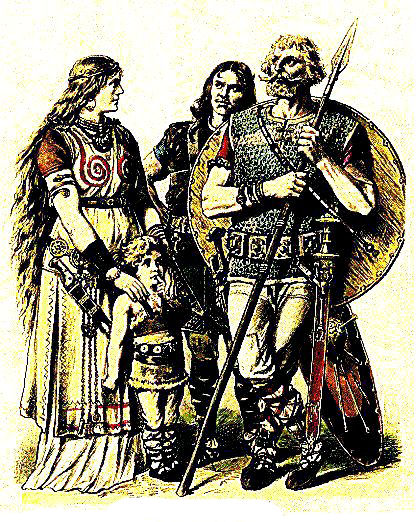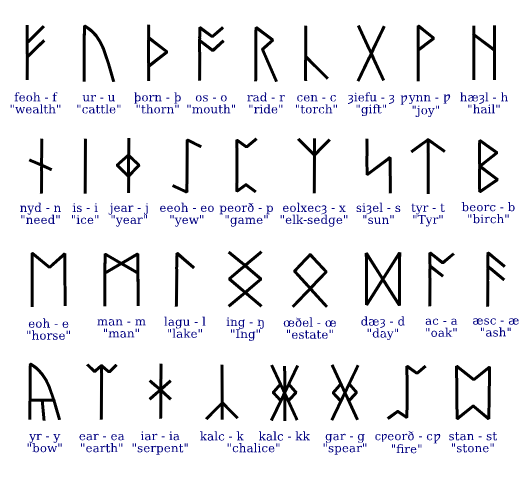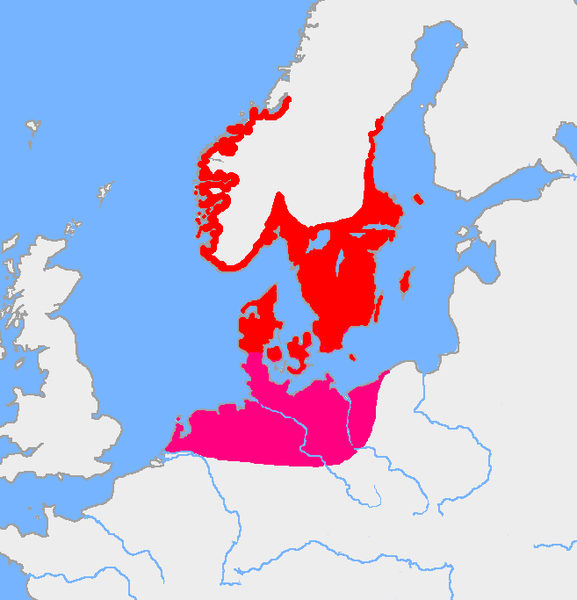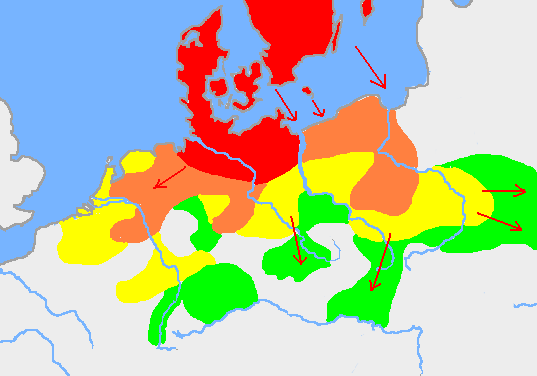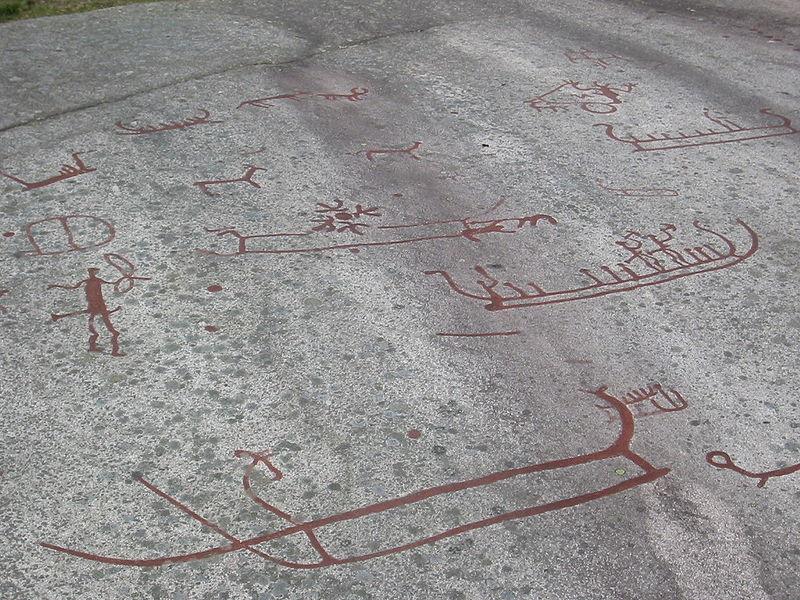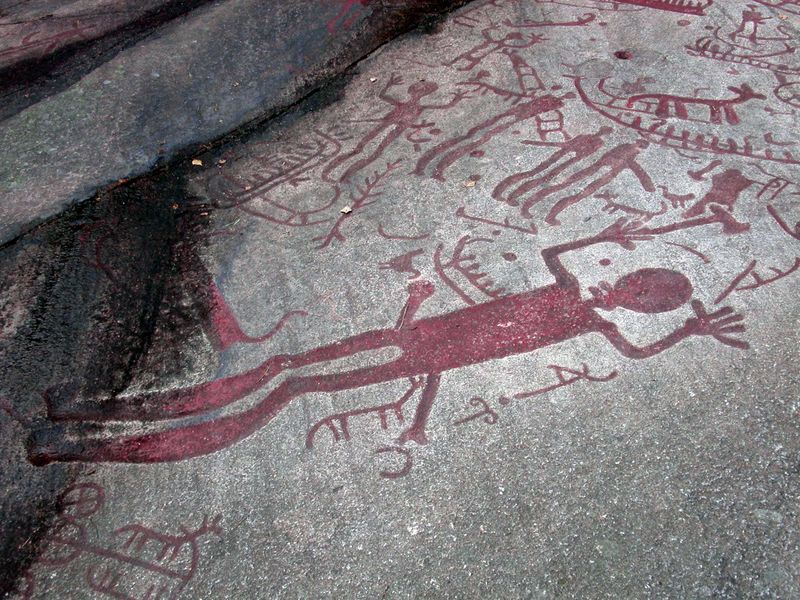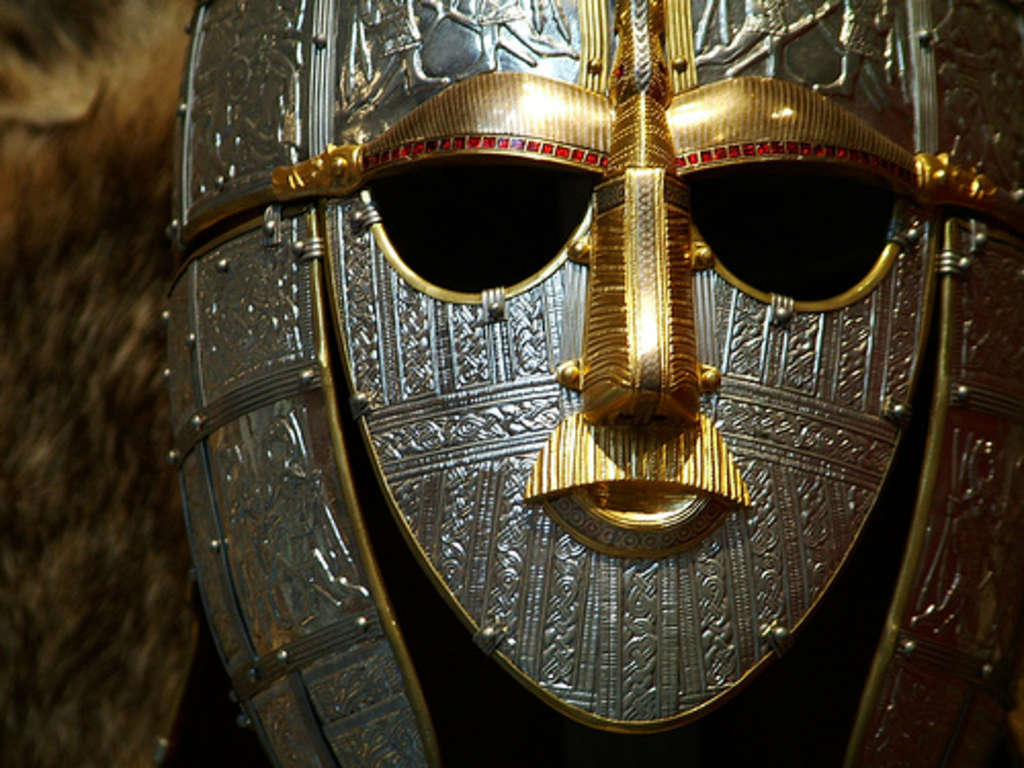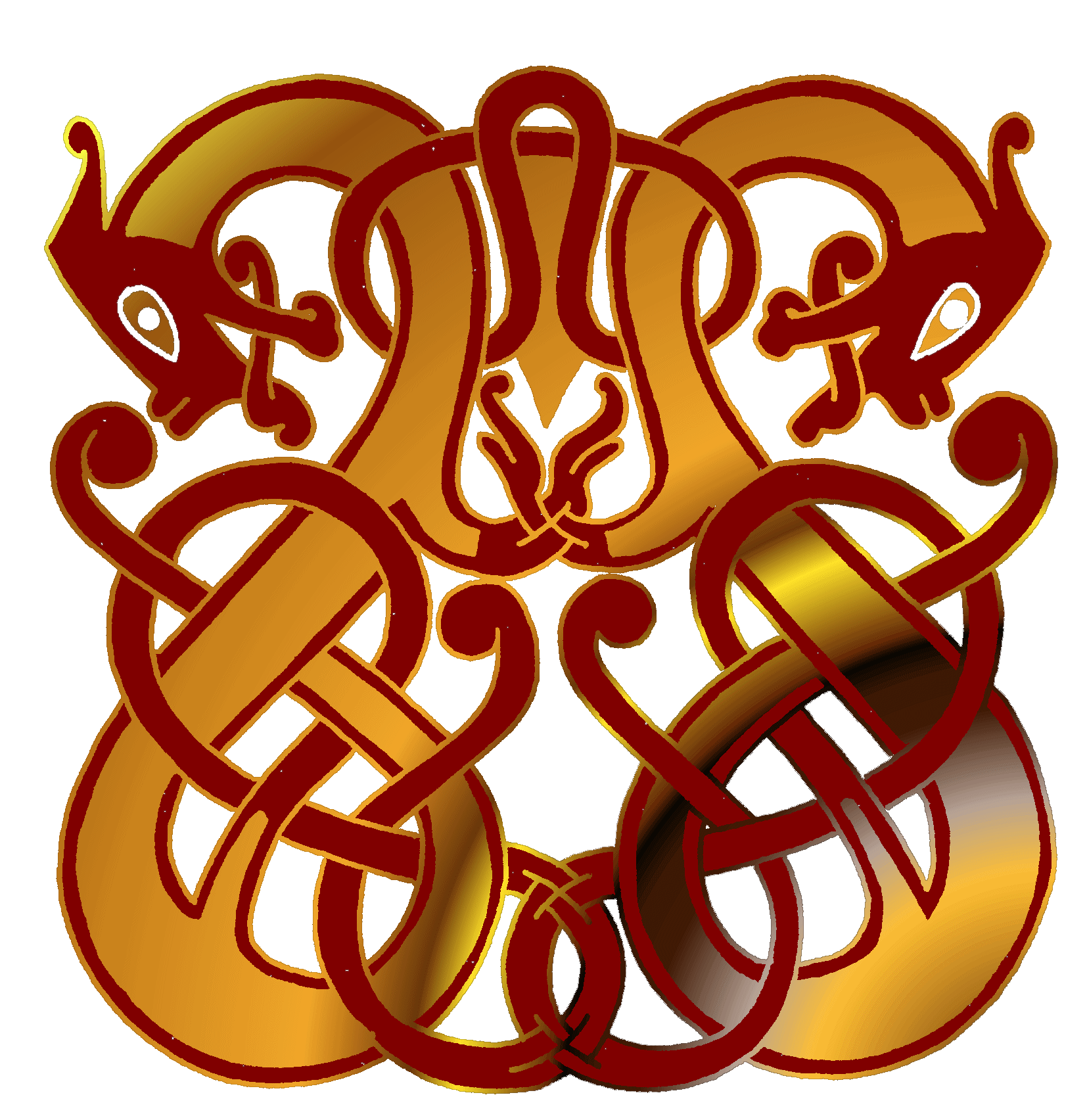Etsy back up.
https://www.etsy.com/shop/NorseWest
After forever the forge is back in action. Trying to find a trip to Denmark/Germany. no customs just what is on here is available for now. Not back to knives yet. Hammer arm is a bit rusty yet.

Skål.
Hröð-
Anglo Saxon word of the day: acweorna
Anglo Saxon word of the day:
ācweorna (squirrel)
The first denotes “oak” the second element “weorna “ denotes squirrel.
Proto-West Germanic: *aikwernō
Old English: ācweorna
Middle English: acquerne
Old Frisian: *ēkworna, *ēkhorna
Saterland Frisian: *Eeker (in Kateeker ?)
West Frisian: iikhoarn, iikhoarntsje
Old Saxon: *ēkhorno
Middle Low German: êkhōrn, êkhōrne, eikhōrne, êkhorn, êkōrn, eikōrn, êkōrne, echhorne
⇒ Dutch Low Saxon: Eekhoorntje
German Low German: Ekkern
Westphalian:
Ravensbergisch: Aik, Aikern
Sauerländisch: Ēksken, Aikerte
⇒ German Low German: Eekhoorntje
Old Dutch: *ēcorno
Middle Dutch: êencōren
Dutch: eekhoorn
Old High German: eihhorno, eihhurno
Middle High German: eichurne
Alemannic German: Eichhore
German: Eichhorn
⇒ German: Eichhörnchen
⇒ Hunsrik: Eichhernche
Old Norse: íkorni
Icelandic: íkorni
Faroese: íkorni
Norwegian:
Norwegian Bokmål: ekorn
Norwegian Nynorsk: ekorn, ikorn
Old Swedish: ēkorne, īkorne
Swedish: ekorre, (dialectal) ikorn
Old Danish: īkærnæ
Danish: egern
Westrobothnian: ickȯrn, ikårn, ikkårn
Elfdalian: aikuonn
Jamtish: íkuðn
Gutnish: eikånn
Scanian: igarne
Bonus:
maniġfeald (manifold, many fold, of many parts)
Old English: maniġfeald, mæniġfeald
Middle English: manifald, monifald, manyfold, manifold
English: manifold, manyfold
Old Frisian: manichfald
Old Saxon: managfald
Old Dutch: *manigfald
Middle Dutch: menichvout
Dutch: menigvoud, menigvoudig
Old High German: manicfalt, manicfaltīg
Middle High German: manecvalt, manecvaltec
German: mannigfaltig
Old Norse: margfaldr
Icelandic: margfaldur
Norwegian: mangfoldig
Old Swedish: mangfalder
Swedish: mångfald, mångfaldig
Danish: mangefold
Gutnish: manggfaldur
Gothic: 𐌼𐌰𐌽𐌰𐌲𐍆𐌰𐌻𐌸𐍃 (managfalþs)
Hröð-
Anglo Saxon word of the day: Uhta
Anglo Saxon word of þe dæg:
ūhta (pre dawn) (last part of night)
Old English: ūht (< *unhtwaz), ūhta (< *unhtwô)
Middle English: *uht (found in compound uhtsang, uhtsong); Middle English: uhhtenn, uȝten, ughten, oughten (< Old English ūhtan, oblique form)
Old Saxon: ūhta
Middle Low German: uchte
German Low German: Uchte, Ucht
→ German: Uchte (“midnight mass”) (regional)
Old Dutch: *ūhto
Middle Dutch: uchte, ochte (various forms are attested, including nuchte through rebracketing, uchten/ochten from the case forms, and rarely uchtent/ochtent from the previous by analogy with avont (“evening”))
Dutch: ochtend
Old High German: uohta (irregular); *ūhta
Middle High German: uohte, ūhte (both rare)
German: Ucht, Aucht (both only in placenames and compounds)
Old Norse: ótta
Icelandic: ótta
Norwegian Bokmål: otte
Westrobothnian: ótt’
Old Swedish: ōtta, ōta
Swedish: otte, otta
Danish: otte
Gothic: 𐌿𐌷𐍄𐍅𐍉 (ūhtwō)
Bonus:
Lagustrǣt (ocean) literally “Water-road”.
Old English: strǣt, strēt
Middle English: strete, streete, stret, strate, street, stræt
English: street
Scots: street, streit, stret
→ Breton: straed
→ Cornish: stret
→ Welsh: stryd
→ Old Irish: sráit (see there for further descendants)
→ Old Norse: stræti (see there for further descendants)
Old Frisian: strēte
North Frisian:
Föhr-Amrum: struat
Mooring: stroote
Saterland Frisian: Sträite
West Frisian: strjitte
Old Saxon: strāta
Middle Low German: strâte
German Low German: Straat, Stroot
Old Dutch: strāta
Middle Dutch: strâte
Dutch: straat (see there for further descendants)
Limburgish: sjtraot, straot
Old High German: strāza
Middle High German: strāze
Alemannic German:
Swabian: Schdrôs
Bavarian: Stråßn, Strossn
Apeltonerisch: Streoss
Mòcheno: stros
Upper Bavarian: Straß
Central Franconian: Stroß
Eifel: Strooß
Hunsrik: Stros
Luxembourgish: Strooss
German: Straße
Rhine Franconian: Schdrooß
And
West Germanic: *lagu
Old English: lagu, lago
Middle English: laȝe, lawe, laie, leye
English: lay
Old Saxon: lagu
Old Norse: lǫgr
Icelandic: lögur
Faroese: løgur
Norwegian Nynorsk: log
Norwegian Bokmål: låg
Old Swedish: lagher
Swedish: lag
Old Danish: low, lou
→ Scots: lyog
Gothic: *𐌻𐌰𐌲𐌿𐍃 (*lagus) (> 𐌻𐌰𐌰𐌶 (laaz))
Hroð-
Anglo-Saxon word of þe dæg:(Brim)
Anglo-Saxon word of þe dæg:(Brim)
ᚪᚾᚷᛚᚩ ᛋᚪᛉᚩᚾ ᚹᚩᚱᛞ ᚩᚠ ᚦᛖ ᛞᚫᚷ᛫
Brim (Ocean, Surf, Sea shore) (poetic) from Proto Germanic “Brimą”. ᛒᚱᛁᛗ᛫
Also: Brimlīþend (seafarer).
Compare:
Old English: brim
Middle English: brim
English: brim
Old Norse: brim
Icelandic: brim
Faroese: brim
…………..
Bonus:
Sēċan (seek, to seek) from Proto Germanic “sōkijaną” . ᛋᛖᚳᚪᚾ᛫
Example:
Hwæt sēcst þū?
What are you looking for?
Hē sōhte rǣd æt his fæder.
He sought advice from his father.
Se hwelp sēcþ þā wiermðe his mēder.
The cub seeks the warmth of its mother.
Compare:
West Germanic: *sōkijan
Old English: sēċan, sœ̄ċan, sēċean
Middle English: seken, sech, seche, secche, sheche, shechen, seichen, siech, sieche, siechen, siche, such, suche, sek, seke, ceken, seik, seike, sieke, sike
English: seek, seech (Lancashire and other dialects)
Scots: seek
Old Frisian: sēka
Saterland Frisian: säike
West Frisian: sykje
Old Saxon: sōkian
Middle Low German: sö̂ken
Low German: sooken, söken, seuken, säuken
Old Dutch: suoken
Middle Dutch: soeken
Dutch: zoeken
Limburgish: zeuke
Old High German: suohhen
Middle High German: suochen
Alemannic German: sueche, süeche
Alsatian: süacha
Bavarian: suacha
Cimbrian: züuchan
Luxembourgish: sichen
German: suchen
Rhine Franconian: suche
Frankfurterisch: [suɣ̥ə]
Old Norse: sœkja
Icelandic: sækja
Faroese: søkja
Norwegian:
Bokmål: søke
Nynorsk: søke, søka, søkje, søkja
Old Swedish: sø̄kia
Swedish: söka
Old Danish: søkia, søkæ
Danish: søge
Gothic: 𐍃𐍉𐌺𐌾𐌰𐌽 (sōkjan)
………..
Hroðbeorht-
Anglo Saxon word of þe dæg: (Hwisprian)
Anglo Saxon word of þe dæg:
ᚪᚾᚷᛚᚩ ᛋᚪᛉᚩᚾ ᚹᚩᚱᛞ ᚩᚠ ᚦᛖ ᛞᚫᚷ᛫
Hwisprian ( whisper) from Proto Germanic “hwisprōną”. ᚻᚹᛁᛋᛈᚱᛁᚪᚾ᛫
Compare:
Old English: hwisprian
Middle English: whisperen
English: whisper
Old Saxon: *hwisparon
Middle Low German: *wispern
German: wispern
……
Bonus:
Faran (go, to go, travel, journey, fare, to fare) also found in the “fare” in farewell. Far tō helle (go to hell) Far wel (farewell). ᚠᚪᚱᚪᚾ᛫
Compare:
West Germanic: *faran
Old English: faran, fearan, fara, færan, færa,
feran
Middle English: faren
English: fare
Scots: fare, fair
Old Frisian: fara
Saterland Frisian: foare
West Frisian: farre
Old Saxon: faran
Middle Low German: vāren
German Low German: fahren
Old Dutch: faran
Middle Dutch: vāren
Dutch: varen
Limburgish: vare
Old High German: faran
Middle High German: varen, varn
Alemannic German: faare, fare
German: fahren
Luxembourgish: fueren
Old Norse: fara
Icelandic: fara
Faroese: fara
Norwegian: fare, fara
Old Swedish: fara
Swedish: fara
Danish: fare
Westrobothnian: fera, fära, fɑra, fara, fåra
Elfdalian: fårå
Gothic: 𐍆𐌰𐍂𐌰𐌽 (faran)
………….
Hroðberht-
Anglo-Saxon wird of the þe dæg: (Brōc)
Anglo-Saxon wird of the þe dæg: (Brōc)
ᚪᚾᚷᛚᚩ ᛋᚪᛉᚩᚾ ᚹᚩᚱᛞ ᚩᚠ ᚦᛖ ᛞᚫᚷ᛫
Brōc (brook, stream) from Proto Germanic “brōkaz”. ᛒᚱᚩᚳ᛫
Compare:
Old English: brōc
Middle English: brook
English: brook
Scots: broke, bruke
Old Frisian: brōk
Saterland Frisian: Brouk
West Frisian: broek
Old Saxon: *brōk
Middle Low German: brôk
Low German:
German Low German: Brook
Ravensbergisch-Lippisch: Brüöke
Suerländer-Märkisch: Brüək
Westmünsterländisch: Bröcke
Plautdietsch: Broak
Old Dutch: bruoc, brōk (attested in placenames)
Middle Dutch: bruec, broec, brouc, brouck, broek
Dutch: broek
Old High German: bruoh
Middle High German: bruoch
German: Bruch
…………..
Bonus:
Rǣde (ready, prompt, prepared) from Proto Germanic “raidaz” ᚱᚫᛞᛖ᛫
Compare:
Old English: rǣde, ġerǣde
Middle English: rædi, rædiȝ, redi, redy, iredi
English: ready
Scots: readie, reddy
Old Frisian: rēd; rēde
North Frisian: ree
Saterland Frisian: reed
West Frisian: ree
Old Saxon: *girēdi
Middle Low German: gerêde, gerêt
Low German: rede, reed
Danish: rede
Old Swedish: rēþo
Swedish: redo
Old Dutch: *reid, *gereid
Middle Dutch: rede, reede, gerede, gereide, gereit, gereet
Dutch: reed, gereed
Old High German: reiti, gireit
Middle High German: gereite, gereit
Old High German: bireiti (< *biraidijaz)
Middle High German: bereite, bereit
German: bereit
Swedish: beredd
Old Norse: reiðr, greiðr; greiðliga
Icelandic: greiður
Faroese: reiður
Norwegian: reiug, grei, rede
Swedish: reda
Danish: rede
Middle English: greithe, greith, graith; greithli
Scots: graith; graithlie
English: graith; gradely
Gothic: 𐌲𐌰𐍂𐌰𐌹𐌸𐍃 (garaiþs)
…………..
Hroðberht-
Anglo Saxon word of þe dæg: (Aern)
Anglo Saxon word of þe dæg:
ᚪᚾᚷᛚᚩ ᛋᚪᛉᚩᚾ ᚹᚩᚱᛞ ᚩᚠ ᚦᛖ ᛞᚫᚷ᛫
Aern (Eagle) from Proto Germanic “arô”. ᛖᚪᚱᚾ᛫
Compare:
Old English: earn
Middle English: earn, ærn, erne, ern
Scots: erne, ern, airne
English: erne
Old Frisian: *ern
North Frisian: earn, iarn
West Frisian: earn
Old Saxon: *arn
Middle Low German: arn, arne
German Low German: Aar, Aadler, Oodler
Old Dutch: *arn
Middle Dutch: āer, āren
Dutch: aar, arend
Old High German: aro, arn
Middle High German: are, adelar, adelare
German: Aar, Adler, Adelaar
Saterland Frisian: Oadeler
Plautdietsch: Odla (Oodler)
Dutch: adelaar
Old Norse: ari, ǫrn
Icelandic: ari, örn
Faroese: ørn
Norwegian Bokmål: ørn
Norwegian Nynorsk: ørn
Old Swedish: ørn
Swedish: örn
Westrobothnian: -ør, -øɳ, -örnn
Old Danish: ørn
Danish: ørn
Westrobothnian: ar (< *arn)
Elfdalian: örn
Gutnish: ann, örn
Scanian: ǫrn
Gothic: 𐌰𐍂𐌰 (ara)
…………
Bonus:
ūle (Owl) from Proto Germanic “uwwalǭ”. ᚢᛚᛖ᛫
Compare:
Old English: ūle
Middle English: oule, owle, ule, howle, owlle
English: owl
Scots: oul, ool
Old Frisian: *ūle
Saterland Frisian: Uule
West Frisian: ûle
Old Saxon: ūwila, ūla
Middle Low German: ûle
German Low German: Uul
Old Dutch: ūla
Middle Dutch: ūle
Dutch: uil
Old High German: ūwila
Middle High German: iuwele, iuwel, iule
Cimbrian: aul
German: Eule
Hunsrik: Eil
Luxembourgish: Eil
Vilamovian: aojł
Old Norse: ugla
Icelandic: ugla
Faroese: ugla, ugli, úla
Norwegian: ugle, ule
Old Swedish: uggla
Swedish: uggla
Danish: ugle
Westrobothnian: øgęl, ögäl
Scots: yuggle (from Old Norse)
……………
Hroðberht-
Anglo-Saxon word of þe dæg: (Wælcyrġe)
Anglo-Saxon word of þe dæg:
ᚪᚾᚷᛚᚩ ᛋᚪᛉᚩᚾ ᚹᚩᚱᛞ ᚩᚠ ᚦᛖ ᛞᚫᚷ᛫
Wælcyrġe ( Valkyrie)(sorceress, witch, female spirit)(daughters of Odin)(Chooser of the slain) from Proto Germanic “walakuzjǭ“. ᚹᚫᛚᚳᚣᚱᚷᛖ᛫
Compare:
Old English: wælcyrġe, uualcyrġe, wælcyrġe, wælcyriġe, walcrigge, walcyrġe
Middle English: walkirie, walkyrie
English: Walkyrie-Valkyrie
Old Norse: valkyrja
Swedish: valkyria
Danish: valkyrie
Faroese: valkyrja
Icelandic: valkyrja
English: valkyrie
Low German: walköre
German: Walküre
Dutch: Walkure
………………..
Bonus:
Bēor (beer) from Proto Germanic “beuzą”. ᛒᛖᚩᚱ᛫
Example:
Gebeotedon beore druncne oret-mecgas, ðæt hie in beor-sele bidan woldon Grendles guðe
The sons of conflict, drunk on beer, promised that they would wait in the beer-hall for Grendel’s attack.
Compare:
West Germanic: *beuʀ
Old English: bēor
Middle English: bere, beere
English: beer (see there for further descendants)
Scots: bere, beir, beer
Old Frisian: biār
Saterland Frisian: Bjoor
West Frisian: bier
Old Saxon: bior
Middle Low German: bêr
German Low German: Beer
Mecklenburgisch: Bier
Plautdietsch: Bea
Old Dutch: *bier
Middle Dutch: bier
Dutch: bier
Limburgish: beer
Old French: biere
Old High German: bior
Middle High German: bier
Alemannic German: Bier, Biär, Pier
Bavarian: Bäia
Cimbrian: bir
German: Bier
Luxembourgish: Béier
Pennsylvania German: Bier
Old Norse: bjórr
Icelandic: bjór
Faroese: bjór
Norwegian: bjor
Middle Irish: beóir
Irish: beoir
………….
Hroðberht-
Rune of þē dæġ (Eolh)
Rune of þē dæġ: (Eolh-Algiz-Elhaz)
Eolh: ᛉ. Modern X.
(Elk, Secg-Sedge, Fortunate, Optimism, Soul, Antenna, Aspiration)
A Rune of intense power for protection and connection. Often the antenna to the nine worlds, this Rune can have results in the opening of spiritual horizons and connections to powers from beyond. A warning is needed as this Rune may work so well it can overwhelm. The Rune poem associates it with the Secg-Sedge plant. A sharp unpleasant plant but is often a symbol of protection. The name of the Rune references the Elk and could be a symbol of Antlers but the poem calls it Elk-Secg referencing the grass as well. Some are skeptical of the Elk connection however the Elder Futhark name maintains the Elk etymology.
Forms: Elhaz, Algiz, Eolh, Eolhx, Eolh-Secg.
Anglo Saxon Rune Poem:
ᛉ secg eard hæfþ oftust on fenne
ƿexeð on ƿature, ƿundaþ grimme
blode breneð beorna gehƿylcne
ðe him ænigne onfeng gedeþ.
The Elk-sedge usually lives in the fen,
growing in the water. It wounds severely,
staining with blood any man
who makes a grab at it.

Hroðberht-
Anglo Saxon ƿord of þē dæġ: (Bera)
Anglo-Saxon word of þe dæg:
ᚪᚾᚷᛚᚩ ᛋᚪᛉᚩᚾ ᚹᚩᚱᛞ ᚩᚠ ᚦᛖ ᛞᚫᚷ᛫
Bera (Bear) From Proto Germanic “berô”. ᛒᛖᚱᚪ᛫
The exact cognate to Norse Björn is “Beorn” but this almost always means warrior not bear. Theories exist suggesting it is related or an old metaphorical word for warrior. Example “Beowulf”.
Compare:
West Germanic: *berō
Old English: bera
Middle English: bere
English: bear
Irish: béar
Scots: beir
Old Frisian: *bera, *bara
Saterland Frisian: Boar
West Frisian: bear
Old Saxon: bero
Middle Low German: bar, bāre
German Low German: Baar, Boor
Plautdietsch: Boa
Old Dutch: *bero
Middle Dutch: bēre
Dutch: beer
Limburgish: baer
West Flemish: beir
Old High German: bero
Middle High German: bër
Alemannic German: Bärr
Cimbrian: per
German: Bär
Hunsrik: Bäer
Luxembourgish: Bier
Vilamovian: baor
Old Norse: bersi, bera, birna; bjǫrn (from oblique stem forms in *bernu-)
Icelandic: bessi, björn
Faroese: bjørn
Norwegian: bjørn, bjønn
Old Swedish: biørn, biorn
Swedish: bjässe, björn
Old Danish: biørn, biorn
Danish: bjørn
Old Gutnish: biorn
Gutnish: bjånn
Westrobothnian: bjern, binn
Elfdalian: byönn
Jamtish: bjenn
Bonus:
Wylfen (wolf like, wolfish,wolven) from Proto Germanic “wulfīn”. ᚹᚣᚠᛖᚾ.
Compare:
Old English: wylfen
(English: wolven)
Old High German: *wolfin
Middle High German: wolfin
……………….
Hroðberht-
Rune of þē dæġ (Peorð)
Rune of þē dæġ: (Peorð)
Peorð: ᛈ᛬ Modern “P”.
(Mystery, Secret, Sexuality, Initiation, Chance, Luck)
The etymology of Peorð is unknown and many theories have been put forward but to this point it is still in question.
ᛈ peorð byþ symble plega and hlehter / ƿlancum [on middum], ðar ƿigan sittaþ / on beorsele bliþe ætsomne
“Peorð is a source of recreation and amusement to the great, where warriors sit blithely together in the beerhall.”

Who are the Norse people (History/Culture post)
The Norse/Germanic people : A brief history:
The history of the Nordic people begins in Central Asia and the Russian steppe when the Indo-Europeans start migrating west into modern-day Europe. During the great migration a branch of the IE moved into present day Scandinavia and became isolated most likely due to climate disruptions. Human beings have occupied Scandinavia for at least 11000 years. It is in the forest and frozen mountains that the Nordic people get the distinct cultural/linguistic identity known as Germanic. After developing a unique culture the Germanic people begin moving south for less turbulent weather and cross the Baltic and North seas into Germany, Poland and Jutland. The migration age tribes founded the modern Nordic countries we know today like Scandinavia (Norway-Sweden-Denmark), Germany and England to name a few.
The culture of the Norse was actually already 1000 years or older when the Viking age began and a new wave of Germanic people again started crossing into Europe and Britain carrying largely the same migration age culture, legal systems, Runic codex and religious beliefs as the previous migrating tribes. Some of the identifying markers of Nordic culture is complicated knot work, exceptional metal/wood work, seafaring/boat building and design, metaphoric poetry and spoken word, grand feasting halls, ancestral worship and equal rights for women. A fact reviled by Roman authors when facing the Teutons in the Alpine regions during the migration age. I use the term Norse as a general description of the larger Germanic culture from its Dutch origin “Noors” “People from the north” because Germanic culture originates in Scandinavia/Denmark.
Runes:Glossary:
We Norsemen have an indigenous alphabet called Runes or the Elder Futhark, The header of my blog is in Anglo-Saxon Futhorc set and many variations exist as the system evolved out of the Elder Futhark. Runes were typically used for marking ownership such as Hermeric owns this knife or Olaf is buried here but many large inscriptions do exist. Each sign also has a divine meaning with immense power behind it. I have often called the Runes the language of the universe. I personally believe in the power behind the Runes. The origin of the Futhark is a mystery, theories exist but none satisfy in explaining the origin. It was largely accepted that a Mediterranean origin like Etruscan might explain it but no early finds exist near the Mediterranean, they all exist in Denmark , Northern Germany and Scandinavia. Now it is theorized that Western Germany/Denmark may be the original zone of expansion and Scandinavia being less explored has some very old inscriptions and “could” be the originator of the Runic script. Some have linked the Runes with the Hallristningar symbols carved in Neolithic Sweden/Norway which adds a new layer of age and interest to the story. The divine description in the Norse Lore is that Allfather Odin pulls them from Ginnungagap as he is hanging from Yggdrasil. A full article on Runic origins and theory will be presented in an upcoming post.
Sites of Elder Futhark discovery in Europe. Common Germanic would be the language. All German languages were mutually intelligible at this time.
Geography:

Nordic Bronze Age. 1700-500 BC
Pre-Roman Iron Age in Germania/Scandinavia 5th/4th – 1st century BC
Germanic Migration 750BC-1AD.
Red= Before 750 BC
Orange= New settlement by 500 BC
Yellow= New settlement by 250 BC
Green= New settlement by 1AD.
………………………………………………………………..
Stone Age Connection to Germanic Culture:
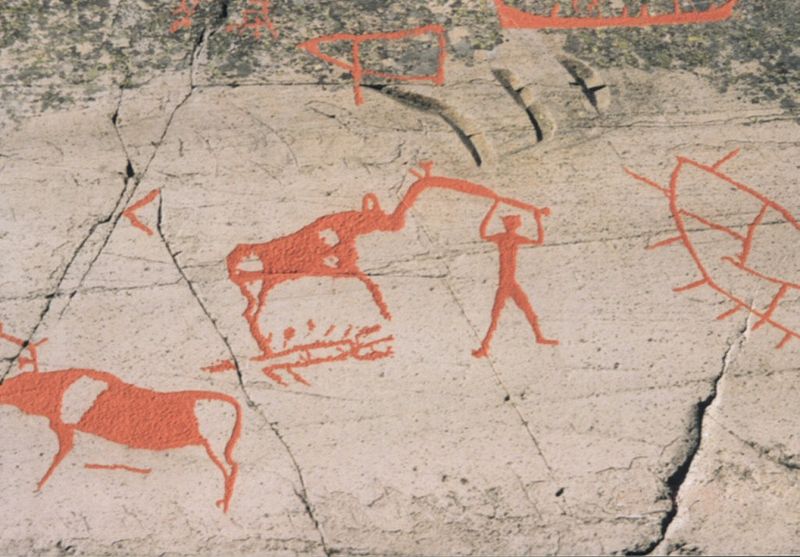 Stone Age Carving from Norway.
Stone Age Carving from Norway.
Complex Nordic Bronze age carving of obvious similar creation as the design above.
Rock carving form Norway (Over 6000 years old) Showing unique artistic elements.
Norway 1200BC
Many images on these stones dating from 6000 years ago tothe Iron age depict many traditions found in Germanic and later Viking age culture such as waging war on boats, farming/herding, fishing, ship design, beings in Germanic religion and symbols found throughout Nordic culture prehistoric to modern. When looking at these images one could understand how the Runes may have evolved out of it stylistically. The exact culture responsible is unknown in some cases but elements can be traced to later Nordic customs.
STONE CARVING PHOTO’S ARE FROM WIKIPEDIA. Copyright to respective owners.
A small gallery of images and symbols. Art of my own creation is marked.

Irminsul: Ancient German totem most likely of Yggdrasil (World tree) Symbol is associated with The Saxons and a Deity called Irmin who is most likely Odin under one of his alias/regional names. (Photo by Varus111) Reconstructed Irminsul in Hildesheim Germany.

Thor-Thunor: Nordic Thunder God. Viking age bronze statue.
Helmet replica from the Sutton-Hoo find. Adorned with glorious plates referencing Nordic customs, legendary figures and amazing detailed metal work. (Not my photo)
Stone carving designs from Gotland Sweden. Copyright Call Of Steel 2012.
Gotland Sweden Stone Carving: Pre Viking. Copyright COS 2012.
Viking age stone carving from Gotland Sweden:Viking age. Copyright COS 2012.
Anglo Saxon decoration. Copyright COS 2012.
…………………………………..
In summary I hope this post gave at least some idea of Norse culture. It is near and dear to my heart as I descend from these mighty folk and try as an artist to keep some element of the old ways alive and well into the future.
Thanks for reading and stay tuned for more Blacksmith and historical posts.
Hroðberht-



